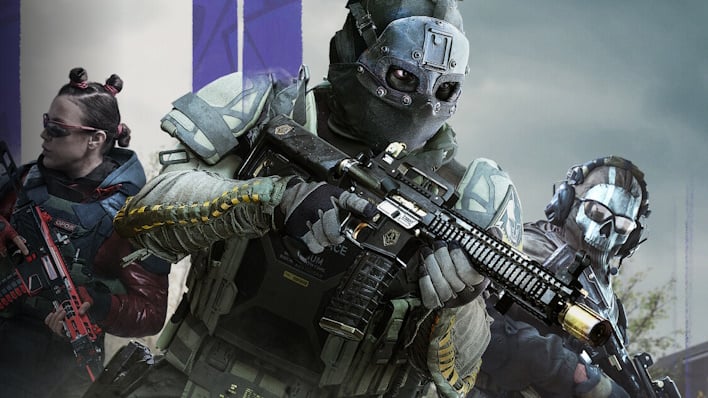FTC's Appeal Could Halt Microsoft's Activision Blizzard Buyout

Table of Contents
The FTC's Concerns Regarding Competition
The FTC's opposition to the merger centers on significant antitrust concerns. Their primary argument revolves around the potential for Microsoft to monopolize key segments of the gaming market, stifling competition and ultimately harming consumers. The acquisition of Activision Blizzard, a powerhouse with iconic franchises like Call of Duty, World of Warcraft, and Candy Crush, would significantly bolster Microsoft's already substantial gaming portfolio.
- Call of Duty's Dominance: The FTC is particularly worried about Microsoft's potential to make Call of Duty exclusive to Xbox, or at the very least, to make it significantly less appealing or available on competing platforms like PlayStation. This could give Microsoft an unfair competitive advantage, driving players towards its ecosystem.
- Price Increases and Limited Availability: The FTC fears that Microsoft could leverage its control over key franchises to raise prices or limit the availability of Activision Blizzard games on rival platforms, ultimately reducing consumer choice and harming competition.
- Market Consolidation: Beyond specific titles, the FTC’s broader concern is about the increasing consolidation within the gaming industry. This merger represents a significant step towards a more concentrated market, potentially leading to less innovation and higher prices for consumers.
Microsoft's Defense Strategy
Microsoft, naturally, vehemently disputes the FTC's claims. Their defense strategy relies on highlighting the benefits of the merger for gamers and emphasizing their commitment to maintaining competition. They've made several pledges to address the FTC's concerns.
- Game Pass Expansion: Microsoft argues that the merger will ultimately benefit gamers through the expansion of Game Pass, their subscription service. By adding Activision Blizzard's extensive catalog to Game Pass, more players will have access to a wider variety of games at a potentially lower cost.
- Licensing Agreements: To alleviate concerns about Call of Duty exclusivity, Microsoft has proposed long-term licensing agreements to ensure its continued availability on competing platforms like PlayStation.
- Cloud Gaming Investment: Microsoft emphasizes their substantial investment in cloud gaming technology, arguing that this will increase accessibility to games across various devices and platforms, fostering a more competitive environment.
Potential Outcomes of the FTC's Appeal
The outcome of the FTC's appeal remains uncertain, with several potential scenarios playing out:
- Scenario 1: FTC Victory – Merger Blocked: A complete victory for the FTC would result in the merger being blocked entirely. This would be a significant setback for Microsoft, but it could also set a strong precedent for future mergers and acquisitions in the tech industry.
- Scenario 2: Partial FTC Victory – Concessions from Microsoft: A compromise might see the FTC winning on certain points, forcing Microsoft to make concessions like stricter licensing agreements or divesting certain assets to ensure competition isn't stifled.
- Scenario 3: FTC Defeat – Merger Approved: If the FTC loses its appeal, the merger would proceed as planned. This would mark a significant win for Microsoft and Activision Blizzard, but it could also raise concerns about future unchecked consolidation in the gaming market.
The timeline for a court decision is crucial, as prolonged legal battles can lead to significant uncertainty and delays, impacting both the companies involved and the wider gaming industry.
Conclusion
The FTC's appeal against the Microsoft-Activision Blizzard buyout is a pivotal moment for the gaming industry. The FTC's concerns regarding competition and market dominance are significant, while Microsoft's defense highlights potential benefits for gamers through expanded access and technological advancements. The potential outcomes—a blocked merger, a modified agreement, or an outright approval—carry profound implications for Microsoft, Activision Blizzard, and the future of gaming. The uncertainty underscores the high stakes involved in this legal battle. Stay informed about the Microsoft-Activision Blizzard merger and follow the FTC's appeal to understand how this crucial regulatory decision will reshape the gaming landscape. Follow reputable news sources for the latest information and analysis on this significant regulatory battle.

Featured Posts
-
 Live Streaming Moto Gp Inggris Sprint Race Jam 20 00 Wib Nonton Di Sini
May 26, 2025
Live Streaming Moto Gp Inggris Sprint Race Jam 20 00 Wib Nonton Di Sini
May 26, 2025 -
 Hasil Fp 1 Moto Gp Inggris Marquez Memimpin Motor Mogok Hentikan Aksi Pembalap
May 26, 2025
Hasil Fp 1 Moto Gp Inggris Marquez Memimpin Motor Mogok Hentikan Aksi Pembalap
May 26, 2025 -
 The Function Of A Sixth Century Vessel Discovered At Sutton Hoo Cremation And Beyond
May 26, 2025
The Function Of A Sixth Century Vessel Discovered At Sutton Hoo Cremation And Beyond
May 26, 2025 -
 The Louisiana Filmed Horror Movie Sinners Release Date Announced
May 26, 2025
The Louisiana Filmed Horror Movie Sinners Release Date Announced
May 26, 2025 -
 Italian Open Director Highlights Role Of Top Players In Shaping Chinas Tennis Landscape
May 26, 2025
Italian Open Director Highlights Role Of Top Players In Shaping Chinas Tennis Landscape
May 26, 2025
